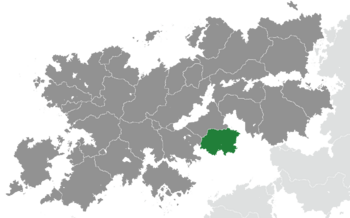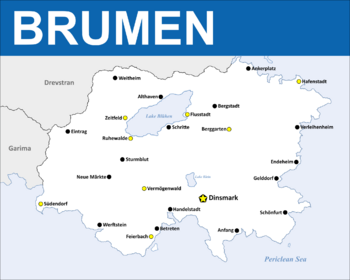Brumen: Difference between revisions
No edit summary |
mNo edit summary |
||
| Line 126: | Line 126: | ||
Originally a decentralized collection of various kingdoms located in Brumen's present-day lands, the threat of [[Holy Audonian Empire|Audonian]] invasions during the Conquest of Garima between the 11th and 12th centuries as well as during the Alban Crusades of the 12th and 13th centuries, prompted the most powerful of these kingdoms: the [[Principality of Waldreich]] to rally the smaller Kingdoms together. Formed in 1198, the [[Allied Kingdoms]] is often considered the predecessor of the modern Kingdom of Brumen and served as a military coalition led by Waldreich. The Allied Kingdoms repelled the Audonian invasions during the Conquest of Gariman as well as the Alban Crusades. Using the momentum from these victories, on 10 June 1305 Waldreich used its {{wp|political capital}} to co-opt the other kingdoms and establish the Kingdom of Brumen, a sovereign nation uniting all the kingdoms with Waldreich elevated to a position of {{wp|primus inter pares|first among equals}} amongst its member states. Since its inception Brumen was established as a {{wp|secular state}}, its constitution known as the ''[[Vereinsartikel]]'' (Articles of Union) intentionally omitting any mention of religion or a monarch's divine right to rule. This large shift from a religious to secular society as largely influenced from Brumen's observation of Audonia's conquests, where religion is used to instigate conflicts. The shift within Brumen's society as a whole however happened more gradually. Originally Brumen was a {{wp|unitary state|unitary}} {{wp|absolute monarchy}}, but through various reformations and a decade long insurrection amongst its member states, the nation gradually transitioned first into a {{wp|federation}} until eventually the monarchy's powers were rendered largely ceremonial in nature. | Originally a decentralized collection of various kingdoms located in Brumen's present-day lands, the threat of [[Holy Audonian Empire|Audonian]] invasions during the Conquest of Garima between the 11th and 12th centuries as well as during the Alban Crusades of the 12th and 13th centuries, prompted the most powerful of these kingdoms: the [[Principality of Waldreich]] to rally the smaller Kingdoms together. Formed in 1198, the [[Allied Kingdoms]] is often considered the predecessor of the modern Kingdom of Brumen and served as a military coalition led by Waldreich. The Allied Kingdoms repelled the Audonian invasions during the Conquest of Gariman as well as the Alban Crusades. Using the momentum from these victories, on 10 June 1305 Waldreich used its {{wp|political capital}} to co-opt the other kingdoms and establish the Kingdom of Brumen, a sovereign nation uniting all the kingdoms with Waldreich elevated to a position of {{wp|primus inter pares|first among equals}} amongst its member states. Since its inception Brumen was established as a {{wp|secular state}}, its constitution known as the ''[[Vereinsartikel]]'' (Articles of Union) intentionally omitting any mention of religion or a monarch's divine right to rule. This large shift from a religious to secular society as largely influenced from Brumen's observation of Audonia's conquests, where religion is used to instigate conflicts. The shift within Brumen's society as a whole however happened more gradually. Originally Brumen was a {{wp|unitary state|unitary}} {{wp|absolute monarchy}}, but through various reformations and a decade long insurrection amongst its member states, the nation gradually transitioned first into a {{wp|federation}} until eventually the monarchy's powers were rendered largely ceremonial in nature. | ||
In the present day Brumen is a {{wpl|Federation|federal}} {{wpl|Parliamentary System|parliamentary}} {{wpl|constitutional monarchy}}, a directly elected bicameral legislature known as the [[Volksrat]] holds {{wp|legislature|legislative power}}, executive power is divided between the Chancellor who serves as the {{wp|head of government}}, and a monarch who serves as a ceremonial {{wp|head of state}}. Brumen maintains a {{wp|mixed economy|mixed economic system}} which is reflected in the significant presence of both {{wp|privately held company|private enterprises}} and {{wp|state-owned enterprise|state owned enterprises}} playing significant roles in the nation's economy. The government exercises some degree of {{wp|economic interventionism|econmic intervention}} in order to promote the {{wp|public interest|general welfare of the people}}. Brumen is a {{wp|developed country}} and provide a wide range of benefits for its citizens such as: a {{wp|universal health care|universal healthcare system}}, various {{wp|welfare|social welfare programs}}, free tertiary level education at public universities and vocational schools. Brumen considers itself as a {{wp|middle power}} of the Belisarian continent. The nation's unified military arm is the [[ | In the present day Brumen is a {{wpl|Federation|federal}} {{wpl|Parliamentary System|parliamentary}} {{wpl|constitutional monarchy}}, a directly elected bicameral legislature known as the [[Volksrat]] holds {{wp|legislature|legislative power}}, executive power is divided between the Chancellor who serves as the {{wp|head of government}}, and a monarch who serves as a ceremonial {{wp|head of state}}. Brumen maintains a {{wp|mixed economy|mixed economic system}} which is reflected in the significant presence of both {{wp|privately held company|private enterprises}} and {{wp|state-owned enterprise|state owned enterprises}} playing significant roles in the nation's economy. The government exercises some degree of {{wp|economic interventionism|econmic intervention}} in order to promote the {{wp|public interest|general welfare of the people}}. Brumen is a {{wp|developed country}} and provide a wide range of benefits for its citizens such as: a {{wp|universal health care|universal healthcare system}}, various {{wp|welfare|social welfare programs}}, free tertiary level education at public universities and vocational schools. Brumen considers itself as a {{wp|middle power}} of the Belisarian continent. The nation's unified military arm is the [[Große Armee des Reiches]] (GAR) comprised of the [[Landstreitkräfte]], [[Luftwaffe]], [[Marinedienste]], [[Küstenwache]] and the [[Staatsgarde]], the latter forming the nation's organized militia component. The armed forces is comprised of a relatively small number of personnel with approximately 180,000 active personnel across all branches except the State Guard and is supported by a substantial domestic arms manufacturing industry. | ||
== History == | == History == | ||
Revision as of 03:10, 4 March 2022
This article is incomplete because it is pending further input from participants, or it is a work-in-progress by one author. Please comment on this article's talk page to share your input, comments and questions. Note: To contribute to this article, you may need to seek help from the author(s) of this page. |
Kingdom of Brumen Königreich Brumen | |
|---|---|
| Motto: Einheit, Wohlstand, Frieden ("Unity, Prosperity, Peace") | |
| Anthem: Vorwärts Brumen Forward Brumen | |
 Location of Brumen highlighted in dark green Continent of Belisaria highlighted in dark grey. | |
 Political Map of Brumen | |
| Capital | Anfang |
| Largest Metropolitan Area | Anfang Metropolitan Area |
| Official languages | Brumen |
| Recognised regional languages | Losh Gariman Gresiye |
| Ethnic groups (2020) | Brumen 81% Lushyod 12% Ludz 3% Gariman 2.8% Greznean 1.2% |
| Religion | Irreligious 67% Aletheic Church 33% |
| Demonym(s) | Brumen |
| Government | Federal Parliamentary Constitutional Monarchy |
• Monarch | Anne-Marie I |
• Chancellor | Immanuel Vogel |
• Chief Justice | Brigitte Schäfer |
| Legislature | Volksrat |
| Bundeskonklave | |
| Bundeskongress | |
| Establishment | |
• Treaty of XX | TBC |
• Treaty of XX | TBC |
• Treaty of XX | TBC |
• Articles of XX | TBC |
| Area | |
• Total | 334,912 km2 (129,310 sq mi) |
• Water (%) | 7.95 |
| Population | |
• 2020 estimate | 35,784,336 |
• 2020 census | 32,893,755 |
• Density | 98.21/km2 (254.4/sq mi) |
| GDP (PPP) | 2020 estimate |
• Total | |
• Per capita | |
| GDP (nominal) | 2020 estimate |
• Total | |
• Per capita | |
| Gini (2020) | 28.3 low (7th) |
| HDI (2020) | high |
| Currency | Bon (Bn) |
• Summer (DST) | Not Observed |
| Date format | DD/MM/YYYY |
| Driving side | left |
| ISO 3166 code | BRU |
| Internet TLD | .bru |
Brumen, officially the Kingdom of Brumen (Brumen: Königreich Brumen), is country located in South-East Belisaria. Brumen is a federal parliamentary constitutional monarchy and is comprised of nine federal states. Its location at South-East Belisaria connects its entire coastline to the Periclean Sea. The country shares land borders with Garima to the north west, Drevstran to the North as well as a maritime border with Greznea to the north east. Brumen covers an area of 334,912 km2 (129,310 sq mi) and has a population of 32 million people, making it one of the less-populated countires compared to its immediate neighbors. Brumen's exclusive economic zone (EEZ) extends 200 nautical miles from the continent's baseline and covers an area of approximately 764.876 km2 (475,272 sq mi). During the classical and late antiquity eras Brumen was part of Tervingia, a gothic political state and significant cultural power in East Belisaria that existed from 323 BCE until its dissolution in 429 CE. Due to this the nation has strong-gothic roots. However after Tervingia's dissolution the gothic peoples that inhabited present-day lands of Brumen developed its own unique Gothic-derived cultural identity that is distinct from its neighbors. The nation's capital is Anfang whereas its financial center and largest city is Wohlstand.
Originally a decentralized collection of various kingdoms located in Brumen's present-day lands, the threat of Audonian invasions during the Conquest of Garima between the 11th and 12th centuries as well as during the Alban Crusades of the 12th and 13th centuries, prompted the most powerful of these kingdoms: the Principality of Waldreich to rally the smaller Kingdoms together. Formed in 1198, the Allied Kingdoms is often considered the predecessor of the modern Kingdom of Brumen and served as a military coalition led by Waldreich. The Allied Kingdoms repelled the Audonian invasions during the Conquest of Gariman as well as the Alban Crusades. Using the momentum from these victories, on 10 June 1305 Waldreich used its political capital to co-opt the other kingdoms and establish the Kingdom of Brumen, a sovereign nation uniting all the kingdoms with Waldreich elevated to a position of first among equals amongst its member states. Since its inception Brumen was established as a secular state, its constitution known as the Vereinsartikel (Articles of Union) intentionally omitting any mention of religion or a monarch's divine right to rule. This large shift from a religious to secular society as largely influenced from Brumen's observation of Audonia's conquests, where religion is used to instigate conflicts. The shift within Brumen's society as a whole however happened more gradually. Originally Brumen was a unitary absolute monarchy, but through various reformations and a decade long insurrection amongst its member states, the nation gradually transitioned first into a federation until eventually the monarchy's powers were rendered largely ceremonial in nature.
In the present day Brumen is a federal parliamentary constitutional monarchy, a directly elected bicameral legislature known as the Volksrat holds legislative power, executive power is divided between the Chancellor who serves as the head of government, and a monarch who serves as a ceremonial head of state. Brumen maintains a mixed economic system which is reflected in the significant presence of both private enterprises and state owned enterprises playing significant roles in the nation's economy. The government exercises some degree of econmic intervention in order to promote the general welfare of the people. Brumen is a developed country and provide a wide range of benefits for its citizens such as: a universal healthcare system, various social welfare programs, free tertiary level education at public universities and vocational schools. Brumen considers itself as a middle power of the Belisarian continent. The nation's unified military arm is the Große Armee des Reiches (GAR) comprised of the Landstreitkräfte, Luftwaffe, Marinedienste, Küstenwache and the Staatsgarde, the latter forming the nation's organized militia component. The armed forces is comprised of a relatively small number of personnel with approximately 180,000 active personnel across all branches except the State Guard and is supported by a substantial domestic arms manufacturing industry.
History
Establishment
Established in 1198, the Allied Kingdoms was Waldreich's first attempt to unify the region and was established as a loose association of the various kingdoms. It is often considered as the predecessor of the later unified Kingdom of Brumen. The Allied Kingdoms originally served as a military alliance that thwarted the first attempted invasion during the Conquest of Garima. After its first victory Waldreich sought to establish itself as the dominant political, military and economic force of the southern lands. The level of economic & political integration under the Allied Kingdoms was minimal with each kingdom was largely free to pursue its own foreign policies. During this time religion was one of society's central pillars with all members of the Allied Kingdoms adhering to the Aletheic Church as the state religion of the area. However the Alban Crusades of the 12th and 13th centuries would lead to significant changes. Experiencing first hand of the effects of wars of conquest caused by religious beliefs, the Allied Kingdoms sought to diminish the influence of religion within its day-to-day and strategic decision making process. The Allied Kingdoms was dissolved and in its place the Kingdom of Brumen was formed. Led by Waldreich, the founders of the Kingdom wrote down the Vereinsartikel (Articles of Union)establishing Brumen as a sovereign nation representing nine constituent states, Waldreich's status was elevated as first among peers as it spearheaded the defense of the Allied Kingdoms with the Monarch of Waldreich serving as the monarch of Brumen. The Articles of Union explicitly left out the usage of divine right, or God's will, strongly implying the separation of the church and state.


